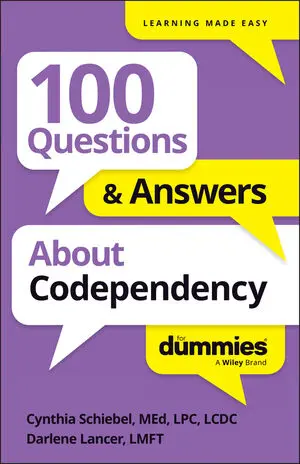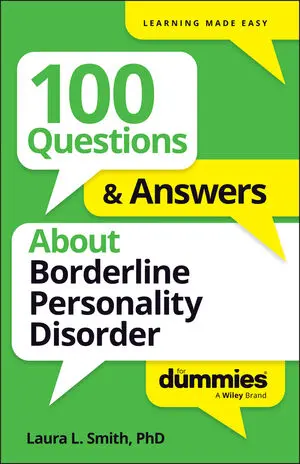Oops! Something went wrong while submitting the form.
Articles & Books From Diagnoses
Everything You Want to Know About Codependency: A Q&A Guide If you believe you may be in a codependent relationship or want to better recognize codependent patterns, 100 Questions & Answers About Codependency For Dummies is your go-to resource. This user-friendly guide helps you uncover the unhealthy pathways to codependency and teaches you how to break free from the cycle.
Everything You Want to Know About Borderline Personality Disorder: A Q&A Guide If you or a loved one are seeking expert advice on borderline personality disorder (BPD), look no further than 100 Questions & Answers About Borderline Personality Disorder For Dummies. With this helpful resource, you'll learn about the symptoms of BPD, explore research-based treatments and therapies, and find out how BPD impacts your relationships with others and yourself.
Cheat Sheet / Updated 04-21-2025
All humans have variations in the way that they think, feel, and experience the world — this is neurodiversity. Autism has been part of our human family for a very long time. This Cheat Sheet offers a glimpse into understanding the big, bold, beautiful world of autism.Test your understanding of autismHow much do you know about autism?
Embrace neurodiversity and foster understanding Autism For Dummies is a comprehensive guide exploring the full spectrum of autism experiences. This essential resource deepens understanding for self-advocates, parents, educators, and professionals, fostering respect and acceptance for all individuals on the autism spectrum.
Article / Updated 04-21-2025
These ten mindset shifts emphasize the importance of celebrating progress, embracing individuality, and fostering resilience in both you and your autistic child. By focusing on strengths, setting realistic expectations, and building a strong support network, you can navigate this journey with patience and love.
Cheat Sheet / Updated 02-26-2024
Understanding and diagnosing attention deficit/hyperactivity disorder, or ADHD, begins with knowing the three types of ADHD and recognizing that they can be exhibited through secondary symptoms as well. To cope with ADHD, explore a number of treatment options and how you can approach them for better results.The three types of ADHDADHD looks different in almost everyone.
Article / Updated 10-20-2023
Maybe you’re wondering whether you’re codependent. It may be hard to tell at first, because, unless you’re already in recovery, denial is a symptom of codependency. Whether or not you identify as codependent, you can still benefit from alleviating any symptoms you recognize. You will function better in your life.
Article / Updated 10-20-2023
The best advice in healing from codependency would be “love yourself.” Does that sound kind of cheesy? Probably. It might even feel wrong because you’re so used to loving other people. Or you may not even know how to love you.But think about those you love. You want to know them, support them, encourage them, give to them, and make them happy.
Article / Updated 10-20-2023
Guilt can, in some instances, actually lead to self-improvement and build self-esteem. The problem for codependents is that their guilt is usually irrational and stems from shame and poor boundaries.Studies show that healthy guilt encourages people to have more empathy for others, to take corrective action, and to improve themselves.
Article / Updated 10-20-2023
Good parenting requires having appropriate and flexible boundaries that respect individuality and separateness. In healthy families, parents respect emotional, mental, sexual, and physical boundaries. In dysfunctional families, boundaries are rigid, blurred, or a mixture. Individual boundaries When boundaries are too rigid, family members are likely disengaged emotionally and physically.





